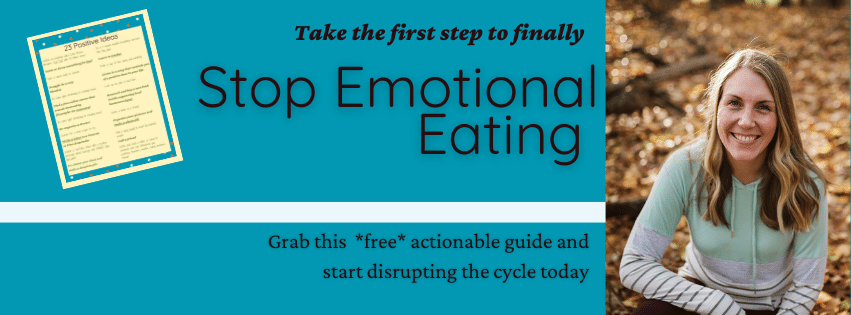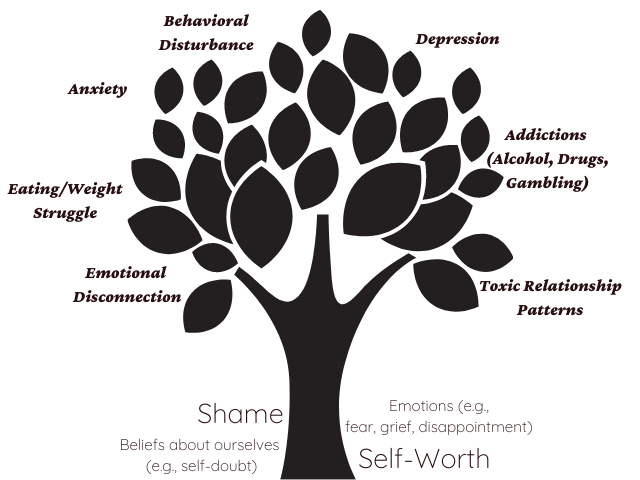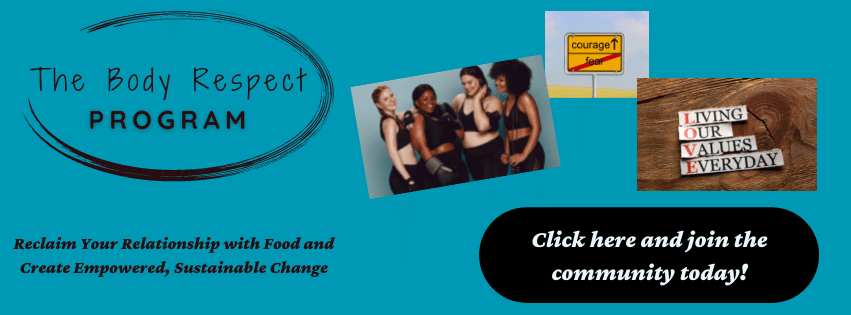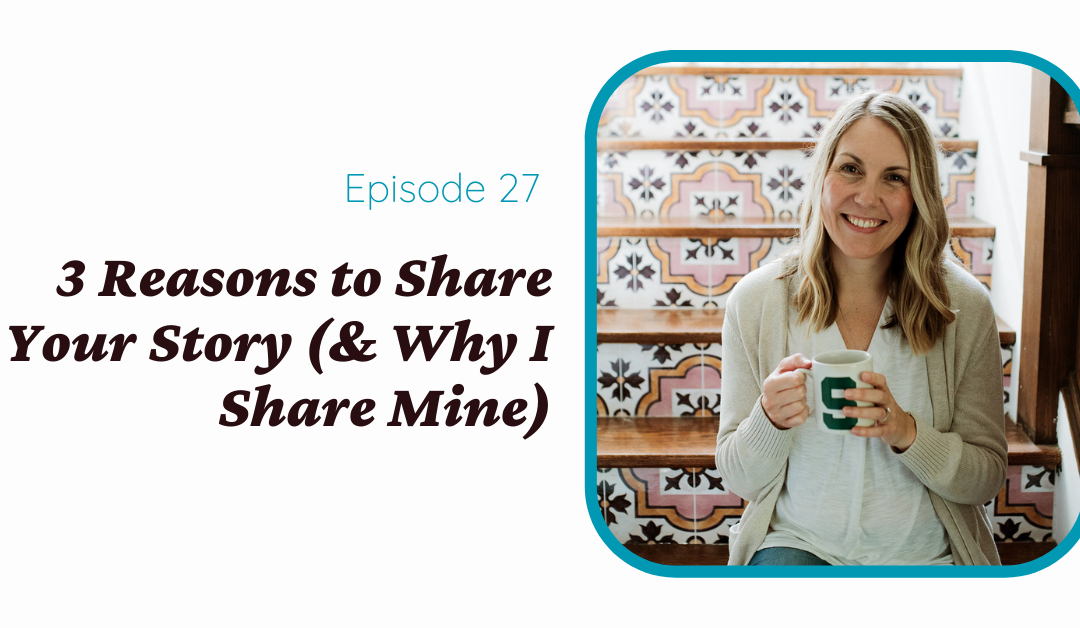Podcast: Play in new window | Download
Subscribe to The Innovative Therapist Podcast! Apple Podcasts | Spotify | RSS | More
Vulnerability is courage in you, and weakness in me
Do you ever read what others write online and think, “Wow that’s brave, but I could never do that.”
If so, I have been where you are.
Back in 2009, I was deep in my binge eating disorder shame spiral. No one knew how much I was struggling. And I wanted to keep it that way.
I was going to solve this dang problem myself if it was the last thing I did.
And then, once I solved it, then maybe I’d share my story.
Ready to Break the Binge Eating Cycle for Good?
Ready to stop avoiding and break the binge eating cycle for good?
The first step is to disrupt the cycle.
My free practical guide has 23 positive ideas for things to do instead of eating. Don’t worry, you wont find the standard diet culture BS advice (take a walk, have some water!)
Take the first step to finally stop binge eating and grab my free practical guide today!

The Power of One Woman’s Story
I started listening to podcasts in 2008 when I was living in Philadelphia going to grad school.
I would walk to and from campus every day, often with one of my beloved podcasts playing in my headphones.
Podcast listening wasn’t as convenient as it is today. I had to download the podcasts from my desktop computer to iTunes, and then plug in my iPod and transfer the episodes to it.
It was not a fast process.
But I had a sense there was something for me to gain from this one woman’s story and I just knew I had to keep listening.
I Had All the Tools, or So I Thought
I had access to all the tools and resources related to evidence-based approaches to eating disorders and weight management.
Literally, that’s what I came to Drexel to study.
I led groups for NIH funded weight management trials comparing standard behavioral treatments to more innovative treatments. I read and researched the psychology and biology of eating behavior every day.
I worked with some of the very top leaders in the eating disorder and weight management fields.
“Maybe I’m Not Broken…”
With access to all these resources, want to know what helped me the most during this time?
Listening to Renee Stephens’ podcast where she shared her story of having binge eating disorder, eating food out of the trash, and eventually achieving peace and freedom in her relationship with food.
Her struggle made me feel a tiny bit less like a total hypocrite and a fraud.
It took away a tiny bit of my shame. And gave me hope.
Are We Really Helping People?
This was also the time when I really started to question things.
I wasn’t seeing any clients or group members make incredible transformations and achieving long-term peace in their relationship with food.
Maybe it wasn’t me, or the clients, or the research participants that were the ones who were broken at all.
Maybe the system was.
“It will always be a struggle for you.”
One of the things you often hear about in the eating disorder and weight management worlds is that if you have and eating disorder, or struggle with your weight, you will probably always struggle.
But don’t worry… you can “learn to manage it.”
How inspiring <enter eyeroll>.
It is even possible to not struggle for the rest of your life?
I remember hearing Renee say things I had never heard before, like:
- There’s a positive intention behind every behavior, meaning you are trying to get something good for yourself when you are eating (e.g., freedom from pain, boredom, comfort, etc.)
- Ask yourself “how will eating this make me feel over time?”
- It is possible to feel relaxed around food and at peace with your body
- How do you want to feel in your body?
Glimmers of Hope and Empowerment
Although at this point in my journey when I was listening to Renee’s story, I was still in diet mentality in many ways. However, I found it really helpful to ask myself some of the above questions.
For the first time, I started to really make a conscious choice to eat or not from a place of self-respect and care.
I found myself passing up the extra donuts left in the lab not due to concern about calories, but instead due to knowing I’d feel really sluggish and unproductive over the next several hours.
For once, I actually felt a little empowered. And a little hope. Maybe I could heal myself fully (not just “manage”).
Something Was Still Keeping Me Stuck
Despite making some improvements with my eating, I was still pretty stuck. Still binge eating with some regularity. And still incredibly ashamed.
Without realizing it, I was still in diet mentality and a restrictive mindset, even though if you’d asked me at that time, I’d tell you:
- “I definitely don’t diet. Diets don’t work. I’m just trying to eat to feel good in my body.”
- “I do not restrict myself from any food.” (I didn’t limit any foods, but I was still in a restrictive mindset)
- “I never skip meals.” (I literally never did)
These Things Were Still Keeping Me Stuck in the Binge Cycle
1. I was still focused on weight loss.
Without realizing it, I was still really hoping that eating in this way would help me lose weight.
In hindsight, there were a few things about The Inside Out Weight Loss podcast that were unhelpful for me.
First, the name of the podcast itself, which indicated that weight loss was the most important goal ( and was still in our control).
Second, Renee would often use the term “naturally slender” to describe people we would want to aspire to be like. (Example: “You know, those people we love to hate who seem to be able to eat anything they want and are always slim.” was often said).
The Podcast Wasn’t Immune from the “Thinner is Better” Mantra
This podcast like most things was influenced by diet culture and the idea that thin is the “best” body type. It made several inaccurate assumptions, like:
- “We should all strive to be naturally slender.”
- “If you do the work to take great care of yourself, you will naturally become thin!”
It completely ignores the reality that many people, when they eat intuitively and remain in tune with their bodies, their bodies remain a shape other than “slender”.
Without realizing it, this podcast reinforced the idea that we are all taught.
Thinner is better. It’s the way to be. “Healthier.”
Although the podcast had many great messages about listening to your body, trusting it, loving yourself, those messages were somewhat drowned out.
And since I wasn’t automatically becoming “naturally slender” based on following the strategies, I still felt I wasn’t “fixed” yet.
2. I was still alone in this journey.
The second thing that kept me stuck is my deep shame about my struggle, which caused me to keep to myself and continue to try to “solve it myself.”
Unfortunately, I waited way too long to seek therapy, with the exception of a few sporadic counseling center visits.
I simply never got to the root of the tree.

Enter Intuitive Eating
I am incredibly grateful I found Intuitive Eating a few years later, which with some additional time and work, I finally ditched the diet mentality (aka restrictive mindset) and stopped binge eating for good.
The diet mentality as an invisible string that was holding me down. I couldn’t see it, but just when I would make progress, I would get pulled back into the binge restrict pattern.
And looking back, this was 100% caused by secretive and sneaky restrictive mindsets that I truly had zero idea were there.
These subtle judgments I had about eating something “unhealthy” would lead me to binge on the food because my brain interpreted the judgment as restriction and future starvation.
Things That Were Actually Helpful In Breaking Free of Binge Eating
I haven’t had a binge episode since 2014.
The peace around food and my body is beyond what I could have hoped for.
This is direct evidence against the statement that “once you have an eating disorder, you will always struggle with it.”
As I reflect on my journey and what was most helpful, it boils down to four main things:
- Hearing stories of others who shared my struggle, and achieved what I wanted. Hearing that Renee Stephens, a high achieving executive, felt completely out of control and hopeless with food and that she came out on the other side a happy, vibrant, energetic soul who had peace with food and the courage to share her story openly. Many others have shared their stories of achieving peace and freedom with food, and building courageous and connected lives on the blog. Listen to their stories here. See yourself in them. And remember: You are not alone. There is nothing wrong with you. You are not broken. And you can break free of the cycle too.
- Learning about Intuitive Eating, the impact of Diet Culture, and my hidden restrictive mindset. This was pivotal for me and the final difference that actually cut the diet mentality cord. Without realizing it, I still was focused on weight loss and what I thought was “being healthy” and judging myself for my choices, which was causing my binge eating. Listening to Intuitive Eating helped me finally give this up for good, and I’ve never felt better physically or emotionally. More importantly, I’ve never felt more connected with the people in my life, or better able to handle the actual difficult emotions underlying all the diet cycle BS.
- Realizing it was never about the food. For years, I was convinced I was semi-addicted to sugary foods like cereal and cake. Now, I know that my brain was just restricted and I had no idea. I still like food. It’s tasty and I love having ice cream or cake or pizza whenever I want with my kids with zero guilt. But it is also, just food. I don’t live for it anymore. I rarely think about it, versus it being something I thought about all day long. It no longer holds any power over me. And now that I’m not distracted by the binge-restrict cycle, I focus on some of the real struggles I have, like difficulty asking for what I need, setting boundaries, and valuing myself (and learning why this became so hard for me in the first place). I’m healing actual shit I have control over, and it feels incredible.
- Asking for help in the right places and sharing my story. For me, this meant eventually going to therapy regularly and working through some of the roots of the tree. I worked to better understand myself, my strong emotions, my shame and how to move towards a life I truly wanted. I learned why I struggled in the past with asking for help, saying no. And I learned how to value myself unconditionally, learning that I have worth regardless of what I do, who I care for, and what I achieve. I couldn’t do it alone. And know I realize, I was never meant to. Now, when I need support or help, I find a way to get it.
4 Reasons to Share Your Story
Ready to share your story too?
There are many ways to share your story behind writing a blog post or doing a podcast (though if you are interested in sharing on Motivation Made Easy, or just sharing it with me (I would never share without your permission) send me an email at info@drshawnhondorp.com! I love hearing from you!).
Remember, sharing and receiving empathy is the antidote to shame.
Most of us live with shame hiding inside of us, impacting us in ways that feel hard to control. It holds us back from true transformation and growth.
Here are some reasons to consider sharing your story:
1. It’s Powerful for You
I don’t share something publicly until I worked it out with myself pretty thoroughly.
Before then, I shared my story in therapy, journaling, talking to friends and family, and with others.
It gets easier with practice, and being able to be open with things I’m ashamed about now is incredibly freeing.
Sharing in this ways allows me to feel more authentic and honest in my relationships. I learn who feels safe to share with and who doesn’t, and it deepens some relationships, and allows me to back away from ones that don’t feel as supportive.
2. It’s Powerful for Others
Here’s the thing, I want you to share for yourself. But sometimes the reality is you need to be brave and go first and it will help someone else.
I ultimately shared my personal disordered eating journey because I know that the traditional ways we are helping people aren’t working. And if I have the power to help just one person feel less shame, and take a small step towards freeing themselves from this terrible life-sucking cycle, I want to do it.
The hope that it would help one person get out of the ineffective diet cycle quicker pushed me to have the courage to share more openly.
3. Stories Are Greater Than Strategies
As a science and strategy-lover, it pains me to say it.
But we all know it’s true.
Strategies without story, without making the person feel understood and connected in some way, is like building a house without a solid foundation. It’s likely going to crumble eventually.
The #1 predictor of whether therapy will work for you is how supported you feel regarding your relationship with your therapist.
Do you feel like they understand you and that you are working well together towards your goals?
Does it feel like a safe space to share your story?
When it comes to healing root causes of pain, this is likely more important than the specific strategies they are teaching you.
4. An Opportunity to Reframe Your Story
There are many ways you could interpret your story. It could be a story of shame, victimhood, and pain (like mine was, a times). Or you can retell it with a new narrative. One of empowerment, determination, and relating differently to your pain so you can live the life you truly want to live.
Getting our story out of our head and down on paper or shared with another human is the first step to retelling our narrative.
I no longer think of myself as an imposter or a hypocrite for having disordered eating struggles and studying the topic in a PhD program. I think of myself as a human being who was having a hard time and trying to solve it for herself, and others.
Inside The Body Respect Program, everyone writes out their story in a workbook and works to reframe it. They also sometimes share with me and/or the group.
Reframing your story and reflecting on how that’s impacted who you are today just might be the difference that makes the difference for you.
Vulnerability Feels Like Danger, But It Is The Opposite
Sharing feels and is vulnerable and scary, and our brains don’t like scary.
Vulnerable, honest stories are how we connect. It’s what brings us closer to others.
But the truth is in this Brene Brown quote:
The difficult thing is that vulnerability is the first thing I look for in you and the last thing I’m willing to show you. In you, it’s courage and daring. In me, it’s weakness.
– Brene Brown
How To Share Your Story
There are many options for sharing your story.
A Few Ideas:
- Journal. Write it out where only you will see. Writing some dark stuff about yourself? Some really cruel thoughts and painful emotions? Good! Bringing it into the light of day is the first step towards healing. (Note: Journaling is a great starting place, but if you are like me – and many of us – it wont be enough to break you out of the cycle by itself).
- Talk to a trusted person. Talk to a friend, co-worker, family member, or other loved one. Tell them a small part, or a long version, of your story. You could say, “hey, I’ve been reflecting on some parts of my past and how they impacted me, can I share it with you?”
- Do something creative. Doing some form of creative work, like painting, drawing, writing, poetry, film making, can be an incredible way to express your story. Creative expression is an excellent way to work through emotion and share your story in a unique way with others. There are even professionals in this field who can help guide you (e.g., art therapist, music therapist, etc).
- Talk to a pro. Talking to a helping professional of some sort. This could be a counselor, therapist, health care professional, or even an online coach.
- Share publicly. Sharing your story on a blog or podcast is another option. Most likely you’d pursue this once you are feeling more healed up and things are less raw. Having experienced this over the past few years, I can say that it’s had the suprising effect of making me feel more authentic and real in most of my relationships. And so far, my fear that someone would call me unprofessional hasn’t come true (at least not to my face!).
Your Why is Hidden in Your Story
Ready to unpack your story for real this time?
Want to learn where you are getting caught in the diet mentality cycle and holding yourself back from the life you were truly mean to live?
The Body Respect Program is now open for enrollment! Sign up here to get all the details about current bonuses and options.
Join the Community Today

It’s never too late to stop dieting and start living.
Disclaimer: This blog and podcast is for informational and educational purposes only. It is not a substitute for individual professional advice or treatment, including medical or mental health advice. It does not constitute a provider patient relationship.
Disclosure: Using the Bookshop.org links in this post means that I would get an affiliate fee if you purchase from the online bookshop (this supports my business, and local bookstores too!).
